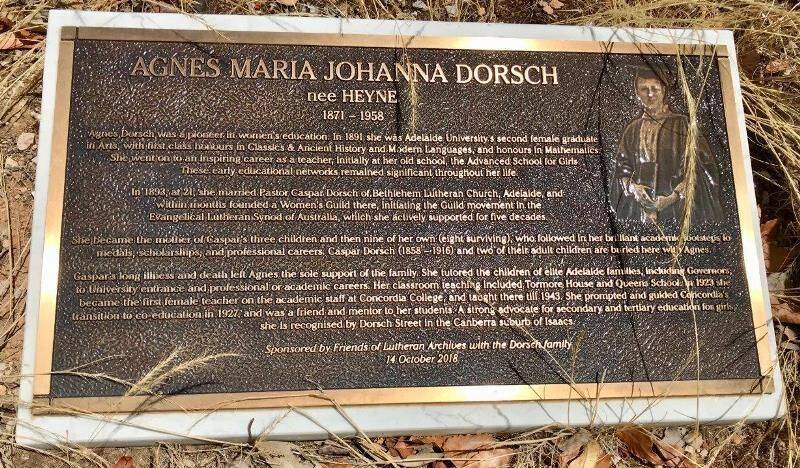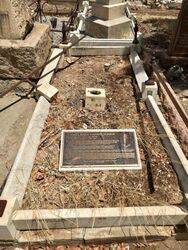
Agnes DorschPrint Page 
Educated at a Unitarian Sunday School and Norwood Public School, Agnes was identified by J. A. Hartley as particularly gifted and given extra coaching in Latin and Greek. She won scholarships to the Advanced School for Girls and the University of Adelaide (B.A., 1891). The second woman to graduate in arts from that university, and one of the first to use state-provided bursaries to higher education, she gained first-class honours in classics and mathematics.
On 5 April 1893 home she married Caspar Dorsch a Bavarian-born, Lutheran clergyman who had studied in the United States of America. He was a widower with three children, and Agnes bore him four sons and four daughters.
Reverend Dorsch forbade dancing, picture theatres and card games, seeing them as signs of the devil, and his constraints cast a heavy shadow over the growing family. When he suffered a breakdown, he was sent to America to recuperate for two years, but remained a semi-invalid. His subsequent inability to maintain a parish necessitated Agnes's involvement in teaching—at Tormore House School under the redoubtable Caroline Jacob, then at Presbyterian Girls' College and later (for about twenty years) at a Lutheran school, Concordia College.
During this time Agnes Dorsch also gave classes at the Young Women's Christian Association and coached private pupils in the evenings. Apart from her daughters she had no domestic help. She was regarded as 'a saint' by her children and fondly remembered for her brilliance as a teacher by several generations of Adelaide students, especially those who went on to do degrees in classics. To be taught by Mrs Dorsch was 'to enter a different world . . . She was big intellectually and culturally'. Many German South Australians had their sense of culture enriched by 'lessons from any of the Heyne family'. Agnes Dorsch 'could read Greek poetry so that it really sounded like poetry'. Her skill in teaching was shared by her younger sisters Laura and Ida, both graduates in arts.
Following her retirement from Concordia in 1942, she continued coaching for many years, even after a stroke at the age of 74. She felt honoured to have taught the children of five governors, including grandchildren of Alfred, Lord Tennyson.
Location
| Address: | West Terrace, West Terrace Cemetery, Adelaide, 5000 |
|---|---|
| State: | SA |
| Area: | AUS |
| GPS Coordinates: | Lat: -34.935303 Long: 138.586351 Note: GPS Coordinates are approximate. |
Details
| Monument Type: | Plaque |
|---|---|
| Monument Theme: | People |
| Sub-Theme: | Education |
Dedication
| Actual Monument Dedication Date: | Tuesday 14th October, 2008 |
|---|
AGNES MARIE JOHANNA DORSCH
nee Heyne
1871 - 1958
Agnes Dorsch was a pioneer in women`s education. In 1891 she was Adelaide University`s second female graduate in arts, with first class honours in Classics & Ancient History and Modern Languages, and honours in Mathematics. She went on to an inspiring career as a teacher, initially at her old the school, the Advanced School for Girls. These early educational networks remained significant throught her life.
In 1893, at 21, she married Pastor Caspar Dorsch of Bethlehem Lutheran Church, Adelaide, and within months founded a Women`s Guild there, initiating the Guild movement in the Evangelical Lutheran Synod of Australia, which she actively supported for five decades.
She became the mother of Caspar`s three children and then nine of her own (eight surviving), who followed in her brilliant academic footsteps to medals, scholarships, and professional careers. Caspar Dorsch (1858 - 1916) and two of their adult children are buried here with Agnes.
Caspar`s long illness and death left Agnes the sole support of the family. She tutored the children of elite Adelaide families, including Governor`s to University entrance and professional or academic careers. Her classroom teaching included Tormore House and Queens School. In 1923 she became the first female teacher on the academic staff at Concordia College, and taught there until 1943. She prompted and guided Concordia`s transition to co-education in 1927, and was a friend and mentor to her students. A strong advocate for secondary and tertiary education for girls, she is recognised by Dorsch Street in the Canberra suburb of Isaacs.
Sponsored by Friends of Lutheran Archives with the Dorsch family
14 October 2018






